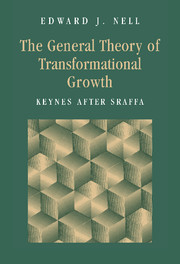Book contents
- Frontmatter
- Contents
- Preface
- Acknowledgments
- Part I History or equilibrium?
- Part II Method and approach: the active mind
- Part III Money and the Golden Rule
- 5 Circulation and production: the need for money
- 6 Circulation and instability: the supply of money
- PART IV The wage-profit trade-off
- Part V Investment and Mass Production
- Part VI Money and fluctuations in the modern economy
- Conclusions
- Bibliography
- Index
5 - Circulation and production: the need for money
Published online by Cambridge University Press: 21 January 2010
- Frontmatter
- Contents
- Preface
- Acknowledgments
- Part I History or equilibrium?
- Part II Method and approach: the active mind
- Part III Money and the Golden Rule
- 5 Circulation and production: the need for money
- 6 Circulation and instability: the supply of money
- PART IV The wage-profit trade-off
- Part V Investment and Mass Production
- Part VI Money and fluctuations in the modern economy
- Conclusions
- Bibliography
- Index
Summary
Basic concepts
Perhaps market competition could take place without money, but it is hard to visualize. The market must bring about the uniformity of prices and wages – the “law of one price.” With decentralized, multilateral exchanges it is difficult to see this happening under barter. Money provides the means by which competition exerts its influence. How in practice could people determine whether the same price was being charged for the same good in different transactions, if prices were expressed in different goods in different places or at different times? It would be necessary to have a complete list of barter ratios, and calculate the cross exchanges. But the equilibrium barter ratios are supposed to be established by competitive pressures – supply and demand – which operate on uniform prices. This problem is nicely avoided by Walras's device of the “auctioneer,” who calls out prices, expressed in a universal standard, and thus establishes that all exchanges will take place at the same price. If there is no auctioneer, however, then the law of one price must be established by competitive pressures. This is a problem in market dynamics, and it can be shown that under plausible assumptions, the processes need not converge to uniform prices. In practice there are no auctioneers – but prices do tend toward uniformity, and this, it will be argued, is because money facilitates competition.
- Type
- Chapter
- Information
- The General Theory of Transformational GrowthKeynes after Sraffa, pp. 152 - 215Publisher: Cambridge University PressPrint publication year: 1998

